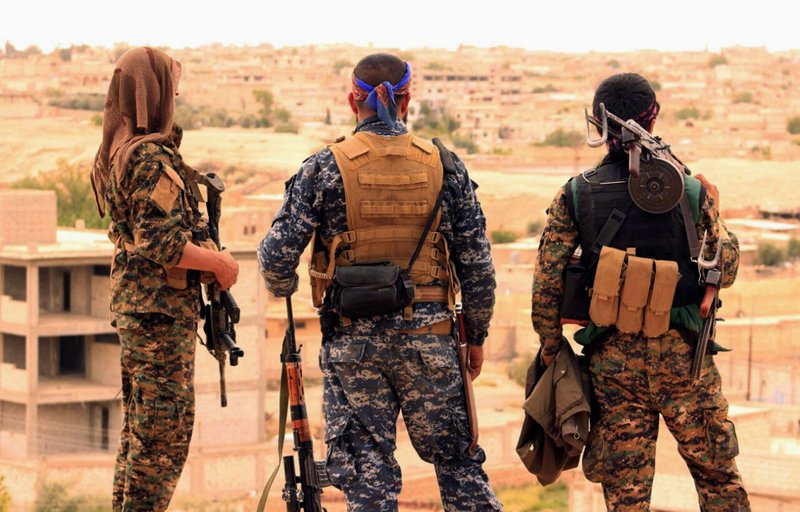WASHINGTON -- The U.S. military on Sunday shot down a Syrian air force fighter jet that bombed forces aligned with the Americans in the fight against Islamic State militants.
The U.S. had not shot down a Syrian regime aircraft before Sunday's confrontation, said Navy Capt. Jeff Davis, a Pentagon spokesman. The U.S. recruits, trains and advises moderate Syrian opposition forces to fight the Islamic State and has pledged to protect them from potential Syrian government retribution. This was the first time the U.S. resorted to engaging in air-to-air combat to make good on that promise.
The U.S.-led coalition's headquarters in Iraq said in a written statement that a U.S. F/A-18 Super Hornet shot down a Syrian government Su-22 that had dropped bombs near the U.S. partner forces, known as the Syrian Democratic Forces.
A statement distributed by the Syrian military said the aircraft's lone pilot was killed in the attack and that the jet was carrying out a mission against the Islamic State.
"The attack stresses coordination between the US and ISIS, and it reveals the evil intentions of the US in administrating terrorism and investing it to pass the US-Zionist project in the region," the Syrian statement said, using an acronym for the Islamic State.
The shootdown was near Tabqa, a Syrian town in an area that has been a weekslong focus of fighting as the Syrian Democratic Forces surround the city of Raqqa, the Islamic State's self-declared capital.
The Syrian Democratic Forces, a coalition of predominantly Arab and Kurdish fighters, is a key proxy force for the U.S.-led coalition in Syria.
The U.S. military statement said it acted in "collective self defense" of its partner forces.
According to a statement from the Pentagon, pro-Syrian regime forces attacked the Syrian Democratic Forces-held town of Ja'Din, southwest of Raqqa in northern Syria, wounding a number of fighters and driving the Syrian Democratic Forces from the town.
U.S.-led jets stopped the fighting by flying close to the ground and at a low speed in a "show of force," the Pentagon said. After the attack by pro-Syrian forces, coalition officials called their Russian counterparts "to de-escalate the situation and stop the firing," it said.
About two hours later, despite the calls to stand down and the U.S. presence overhead, a Syrian Su-22 jet dropped munitions on the Syrian Democratic Forces. Col. John Thomas, a spokesman for the U.S. Central Command, said the Syrian aircraft arrived with little warning and that U.S. aircraft nearby tried to hail the Syrian jet after it had dropped its bombs.
After the hailing attempts, a U.S. F/A-18 shot down the Syrian aircraft "in accordance with rules of engagement and in collective self-defense of coalition partnered forces," the Pentagon said.
Thomas rejected the Syrian government's claims that the aircraft was bombing the Islamic State, adding that the terrorist group had not been in the area for some time.
"The coalition's mission is to defeat ISIS in Iraq and Syria," the Pentagon said. "The coalition does not seek to fight Syrian regime, Russian or pro-regime forces partnered with them, but will not hesitate to defend coalition or partner forces from any threat."
Border gains
In a step the Syrian military described as a major achievement, Syrian troops and allied militias met up with Iraqi forces at one crossing point along their shared border Sunday for the first time in years.
The meeting with Iraqi forces, reported by pro-government media, took place a day after Iraqi forces captured a border crossing point with Syria, al-Waleed, from the Islamic State. It was not immediately clear whether the Syrian forces reached a new point along their border with Iraq or whether it was the Iraqi forces that had moved northeast of their newly captured point.
Rami Abdurrahman, the head of the Britain-based Syrian Observatory for Human Rights, an opposition monitor group, said the link between Iraqi and Syrian forces will allow Iraqi fighters, including pro-Iran militias, to move inside Syria, joining the Syrian government's campaign against Islamic State strongholds in eastern Syria's Deir el-Zour province.
Also on Sunday, Iran's Revolutionary Guard Corps launched several midrange missiles from western Iran and struck targets in Syria, aiming to punish "terrorists" who committed this month's attacks in Tehran, it said in a statement.
The Revolutionary Guard said it "targeted the headquarters and meeting place and suicide car assembly line" of "ISIS terrorists" in the Deir el-Zour province, where Islamic State forces surround an estimated 200,000 people in a government-held section of the provincial capital of the same name.
The strikes killed "a large number" of militants and destroyed equipment and weapons, the statement said.
The Revolutionary Guard said the strike, which sent missiles flying over neighboring Iraq into Syria, had been carried out in retaliation for the terrorist attacks this month on the Iranian parliament and the shrine of the founder of the Islamic republic. Eighteen people died in those attacks and dozens were wounded. The Islamic State claimed responsibility.
Information for this article was contributed by Robert Burns, Lolita C. Baldor, Sarah el Deeb and Albert Aji of The Associated Press; by Thomas Gibbons-Neff, Kareem Fahim and Louisa Loveluck of The Washington Post; and by Thomas Erdbrink of The New York Times.
A Section on 06/19/2017
